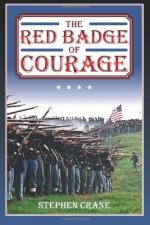|
|
The Red Badge of Courage Topic Tracking: Fear of Battle
Chapter 1
Fear of Battle 1: Henry's first reaction to the thought of battle once he is stationed in camp is a confused one. He is having a hard time reconciling the images of war that have been idealized in schoolbooks, of Greek soldiers cutting a valiant profile through battle, with the drab reality of day to day life in a muddy camp. He is scared of having to live up to the Greek ideal because he doesn't know if he possesses the "strength" he thinks it would take to fight bravely. At the same time, he questions the existence of the ideal at all, for in the present day, camp is nothing like a storybook. He though he would feel the heroism of lore once he enlisted, but perhaps it is simply something he has constructed within himself.
Chapter 2
Fear of Battle 2: Fear remains, for the first part of the novel, an internally constructed phenomenon. Henry is not afraid of battle itself - he cannot be, for he has never been in battle before. He is sick with anticipation and expectation; both are eating him alive. The fear here is as bad as it is at any other point in the book; not because of the immediate threat of death, but because of the unreconciled walk into the unknown.
Chapter 3
Fear of Battle 3: Henry is caught in limbo here - the anticipatory fear has reached a point where it ebbs and flows in his mind as he alternately wants it to go away, and tries to justify it. Here Henry reaches a point of self-assured justification.
Fear of Battle 4: This is the first time that real, visceral fear is evident in a soldier. In a way this is the proof Henry has been looking for - the Loud Soldier has let Henry know that he is not invincible, and Henry has evidence that others share his fear.
Chapter 4
Fear of Battle 5: The fear glimpsed in the Loud Soldier becomes more generally evident; the difference between the veteran regiments and the youth's untried regiment also reveals itself. There is a great difference in the way each one reacts to battle - the initial reaction of the new regiment is outright fear, while the outward reaction of those who have already seen battle and witnessed death, is to respond with biting sarcasm and black humor.
Chapter 6
Fear of Battle 6: Just as Henry's internal doubts follow cycles in the novel, his reactions to battle are just as confused. In the moment of fighting he is an invincible machine, in the moment afterward he feels joy and control over the aggressors, and in the next moment he feels the enemy to be overwhelming him completely.
Chapter 11
Fear of Battle 7: The burst of courage that Henry feels is purely produced by the actions of those around him; he feels compelled to be like the idealized warriors he perceives the men in front of him to be. Yet, his internal doubt of being able to fulfill the social expectations that he feels ultimately holds him back from acting on this burst of courage.
Chapter 12
Fear of Battle 8: With Wilson's newfound maturity comes an acceptance of battle, which is neither the quaking fear of the new regiment or the biting sarcasm of the veteran soldiers. This is the first glimpse of the true internal strength that Henry searches for within himself. It is a glimpse of something that does not surface often among the soldiers who have found it, for Henry sees that the veterans often cover up this internal strength with a cocky sarcasm that is both imposing and difficult to see through.
Chapter 17
Fear of Battle 9: "Fear" of battle has perhaps given way to something more subtle; with Henry's acceptance of battlefield reality comes a more pervasive feeling of injustice that Henry felt on the previous day when he felt pushed along by his regiment. This feeling is one of a desperate helplessness, breeding an all-encompassing hatred. This sense of hate, ironically, helps Henry to achieve the storybook ideal of the warrior, and find inner peace.
Chapter 20
Fear of Battle 10: Throughout this entire sequence of charge, retreat, and charge, Henry and the rest of the men are spurred on by the sense of the collective that they had discovered the day before. Although this sense of the whole grips the men both for the advances and the retreats, Henry and Wilson's lead under the regimental flag becomes a rallying symbol for this collective and, ultimately, leads to their sense of success when they overtake the enemy.
Chapter 23
Fear of Battle 11: At this point, Henry's fear has given way almost completely, and has been replaced by a need for some type of justice in the face of Henry's own command, and against the enemy, be that through victory or death.




